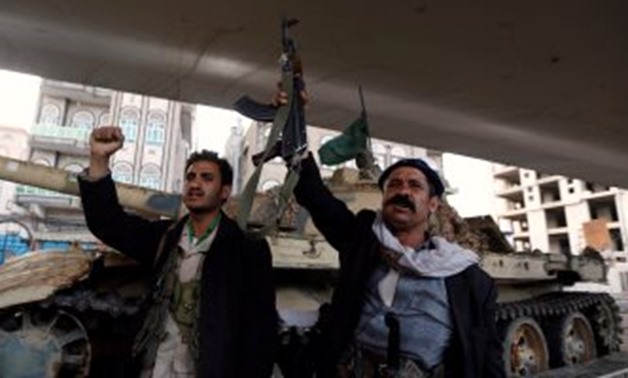
FILE –Houthi rebel fighters
CAIRO – 6 December 2017: Ambiguity prevails in the political, security and military scene in Yemen since Monday after the assassination of the former Yemeni president and leader of the General People’s Congress Party (GPC), Ali Abdullah Saleh, and his assistants by Iran-backed Houthis.
The 69-year-old’s assassination came just days after his announcement of breaking off ties with Houthis and his willingness for dialogue with the Saudi-led coalition.
At the security level, it is also expected that Houthis will seek to take control over the capital Sana’a, and assassinate and arrest leaders of the GPC in the next few days.
Some parliament members and experts in Arab matters expressed their expectations regarding the Yemeni future. Saad el-Gammal, head of the Arab Affairs Committee, said that the Yemeni president betrayed his country when he allied with Houthis in an attempt to destroy Yemen.
"Then Saleh announced the war against Houthis and called for an uprising against them; he expressed his willingness to engage with the Arab coalition countries, which led the Houthis to attack his house and kill him," added Gammal.
"Supporters of Ali Saleh and his tribe will react strongly to what happened which will have negative consequences not only on Yemen but on the whole region," stated Gammal, adding that he sympathizes only with Yemeni people, hoping they avoid all these bloody conflicts.
In the same context, political expert Abdel Moneim Said stated that Houthis were very powerful; Saleh had chosen the wrong way when he allied with them for a long time, and he had to be careful announcing war against them.
"Iran-backed Houthis were able to enter a war against the leaders of GPC, and started with killing Saleh," Said added, pointing out that Saleh’s murder created a state of imbalance in his forces, but that imbalance is not expected to last for long because the army also has tribal ties.
"The conflict in Yemen will continue to be more severe in the coming stage, especially that Iran supports the Houthis with money and weapons; also, the assassination process involved foreign intelligence services, enabling Houthis to kill the Yemeni president," Said explained.
Parliament member Mostafa Bakry stressed that Yemen now faces a lot of risks as well as street fights of political and tribal nature as Saleh belongs to one of the biggest tribes in Yemen.
"The next phase will witness an increase in the influence of Iran in Yemen which will threaten Gulf States; moreover, Houthis will further control the executive positions in the country, which will lead to civil war," added Bakry.
The U.N. Security Council issued a statement expressing serious concern about the devastating humanitarian impact of the conflict, and calling on all parties to allow unhindered access for humanitarian supplies, and to facilitate access for essential imports of food, fuel, and medical supplies. It also called on all parties to renew their commitment to a cessation of hostilities.
In December 2017, former President Saleh reportedly switched war sides and his forces clashed with Houthis in the capital Sana'a. A Houthi-affiliated TV station announced the murder of Saleh after fierce fighting in the capital.

Comments
Leave a Comment